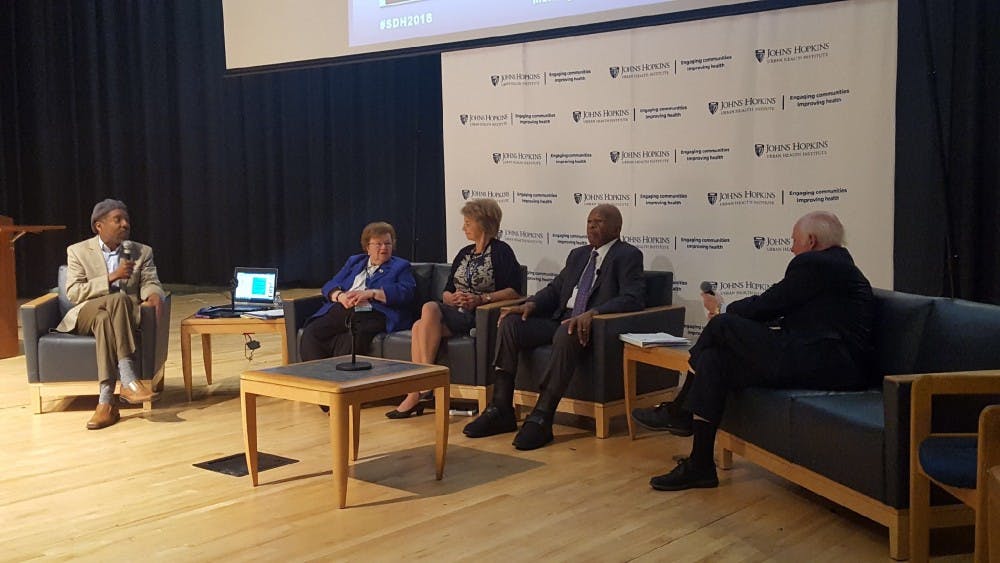The Hopkins Urban Health Institute, in collaboration with the Office of the Provost, held its annual symposium on the social determinants of health at the East Baltimore campus this Monday. This year’s symposium focused on activism and social justice in the past 50 years.
The symposium included a panel on political and social activism in Baltimore. The speakers in the panel discussed ways in which people can engage with the community to improve the City through a greater focus on social justice.
Durre Smith, a Baltimore native and speaker on the panel, serves as the vice president of Tubman House, a grassroots organization which advocates for political and social activism in West Baltimore communities.
During the panel, Smith stressed the importance of building relationships between community members and students in Baltimore. She also believes that students in Baltimore should understand the City’s history.
“You don’t just go into someone’s home and give them what you think they need. You need to build relationships,” she said. “You also need to study the history of movements of the past, and understand what worked and didn’t work before you take action.”
Katrina Bell McDonald, an associate professor of Sociology and co-director of the Center for Africana Studies at Hopkins and Erika Huggins, a Black Panther Party member, former political prisoner, poet and human rights advocate, also gave a talk about womens’ role in social and political activism.
Huggins explained that she first joined the civil rights movement because she wanted to obtain human rights for African Americans. Huggins believes that portrayals of the Black Panther Party miss the full picture and that many people do not understand the full scope of the Party.
Huggins said that while the Party has been militant when it needed to be, it was originally created to help better the lives of African-American people. She noted that, for example, the Party has provided food, community schools and education to black children.
Jasmine Campbell, the director of the Living Classrooms Under Armour House, an organization which provides education and job training in Baltimore, attended the symposium. She stated that most people don’t know all the different things the Black Panther Party did.
“It was militant if it had to be, but the basis of movement was filling the holes in the American Promise for black people,” she said. “So providing food, community schools and educating children, these were all things they were doing in the movement.”
Brendan Walsh and Willa Bickham are the co-founders of Viva House, a soup kitchen which provides temporary housing for women and children experiencing homelessness. Walsh and Bickham discussed the role of the church in the anti-war movement. Additionally, Walsh critiqued wealth inequality and war. He mentioned that he was involved in nonviolent protests against the Vietnam War.
The DewMore Baltimore Youth Poetry Team also presented original poetry. DewMore Baltimore is a national, award-winning youth program that engages youth between the ages of 13 to 19 who live in or around Baltimore City.
Campbell described the poetry team’s performance as thought-provoking.
“The poets talked about the black experience in America in a beautiful poetic way,” she said. “While one can speak directly and radically talk about the way they feel, the poets instead conveyed their message in an artistic way, which I believe is far more effective in getting others to see one’s viewpoint.”
Campbell also enjoyed that the speakers at the event directly addressed social issues.
“I think it’s wonderful that we’re having these conversations,” she said. “In many community conversations about social justice and determinants, there’s a lot of tiptoeing around the root issues, but today, I felt like it was the most honest discussion I’ve ever been part of. The speakers came with a variety of thoughts and different perspectives.”
Erika Ford, a graduate student at the University of Maryland, Baltimore, attended the event and also echoed Campbell’s sentiment.
“I was definitely surprised at some of the speakers...and think it was good that people were not afraid to speak the truth,” she said.
Amber Potter, a junior at University of Baltimore, appreciated that the symposium focused on the history of political activism.
“I like how the symposium placed importance on history because it’s good to know and learn from social activism in the past,” she said. “We have to learn from what people did in the past and what they worked for and what we still need to work for.”





